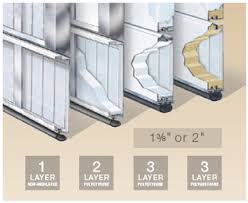How Much Can You Save?

When it comes to garage doors, insulation plays a crucial role in energy efficiency, home comfort, and long-term cost savings. If your garage is attached to your home or used as a workspace, having a properly insulated door with a high R-value can make a significant difference in heating and cooling expenses. But what exactly is an R-value, and how does it impact your energy bills? Let’s break it down.
What is R-Value in Garage Door Insulation?
The R-value measures the effectiveness of insulation in resisting heat flow. The higher the R-value, the better the insulation performance. A well-insulated garage door helps maintain stable indoor temperatures, reducing the strain on your HVAC system.
- Low R-Values (R-0 to R-6): Basic insulation or no insulation at all. Suitable for detached garages or mild climates.
- Medium R-Values (R-7 to R-12): Provides decent thermal resistance and noise reduction. Ideal for attached garages.
- High R-Values (R-13 to R-20+): Offers superior insulation, energy savings, and comfort. Best for extreme climates and homes with living spaces above or beside the garage.
Types of Garage Door Insulation & Their R-Values
Garage doors come with different insulation materials, each with unique R-values:
Single-Layer (Non-Insulated, R-0 to R-2)
- No insulation; just steel or aluminum panels.
- Least effective for energy efficiency and temperature control.
- Best for standalone garages with minimal heating concerns.
Polystyrene Insulation (R-6 to R-10)
- Foam board insulation, often used in 2-layer or 3-layer garage doors.
- Increases thermal resistance but may not provide the highest efficiency.
- Affordable and a good middle-ground option.
Polyurethane Insulation (R-12 to R-20+)
- Injected foam insulation that expands to fill gaps.
- Stronger, denser, and offers the best insulation.
- Reduces energy loss and helps with noise control.
How Much Can an Insulated Garage Door Save You?
The savings depend on various factors, including climate, home insulation, and garage use. However, studies have shown that insulated garage doors can:
- Reduce energy loss by up to 70% compared to non-insulated models.
- Lower heating and cooling costs by 10-20%, especially in extreme climates.
- Improve home resale value, as energy-efficient features are attractive to buyers.
For example, if your home loses 20% of its heat through an uninsulated garage, adding an R-16 garage door could significantly cut that heat loss. If your monthly heating bill is $200, an insulated door could save you $20–$40 per month—or $240–$480 per year!
Other Benefits of High R-Value Garage Doors
Beyond energy savings, insulated garage doors offer:
✔ Temperature Control – Keeps your garage warmer in winter and cooler in summer.
✔ Quieter Operation – Reduces outside noise and vibrations when opening/closing.
✔ Stronger Durability – Reinforced doors withstand weather and daily wear better.
✔ Improved Home Comfort – Reduces drafts in rooms above or next to the garage.
Is an Insulated Garage Door Worth It?
If your garage is frequently used, an insulated garage door with a high R-value is a worthwhile investment. The upfront cost is offset by lower energy bills, increased comfort, and added property value.
At American Garage Doors, we offer high-quality insulated garage doors designed to enhance energy efficiency while keeping your home comfortable year-round. Contact us today to explore your options and start saving on energy costs!
Final Thoughts
Choosing the right R-value for your garage door isn’t just about insulation—it’s about maximizing energy efficiency, enhancing comfort, and saving money. Whether you live in a cold or hot climate, upgrading to an insulated garage door is one of the smartest home improvements you can make.
Want expert advice? Call American Garage Doors today! 🚪🔧💡







